Caitlin Clark should have known better.
No, not the flagrant foul heard ‘round the league. That was fine in my book, no matter how much a forearm wrapped around fellow WNBA combatant Angel Reese landed the two players in yet another frustrating narrative about a rivalry that goes back to their college days.
It was a comment Clark made during a media call heading into last weekend’s season-opening games that even she, in retrospect, would have to laugh at.
“I know what to expect now,” Clark said, looking ahead to her second year as a pro and believing her first had prepared her for anything.
As if anything about her career arc follows a predictable path. The only certainty is that the conversation will quickly move beyond the court to being the latest referendum on women‘s sports culture. Clark versus Reese is regularly cast as an issue of race, popularity, decorum, unfair criticism, and unnecessary scrutiny. And while it’s certainly true that there is no such thing as bad publicity, especially for a league that continues to grow its audience in exponential ways, I look forward to the day where it’s more (or at least as much) about the game than it is about their relationship.
The latest reminder of their singular ability to move the conversational needle arrived almost as soon as the season began. With 4:38 left in the third quarter of the Indiana Fever’s season-opening 93-58 win over the Chicago Sky, Reese, who had grabbed an offensive rebound, was going up for the putback. Annoyed that Reese had gotten away with an obvious shove while hitting the glass, Clark made certain Reese wasn‘t going to make the basket. The hard foul sent Reese tumbling to the ground. She bounced up ready to fight, though Clark walked away while teammate Aliyah Boston held Reese back.
The upshot was nothing more than an upgraded flagrant foul for Clark and technical fouls for Boston and Reese.
“Let’s not make it anything that it’s not,” Clark said later. “It was just a good play on the basketball. I’m not sure what the ref saw to upgrade it. That’s up to their discretion after watching the initial whatever happened during the play and then whatever happened after.
“It’s a take foul, to put them at the free throw line,” she added. “I wasn‘t trying to do anything malicious. That’s not the type of player I am.”
Or as Reese put it: “Basketball play. Refs got it right. Move on.”
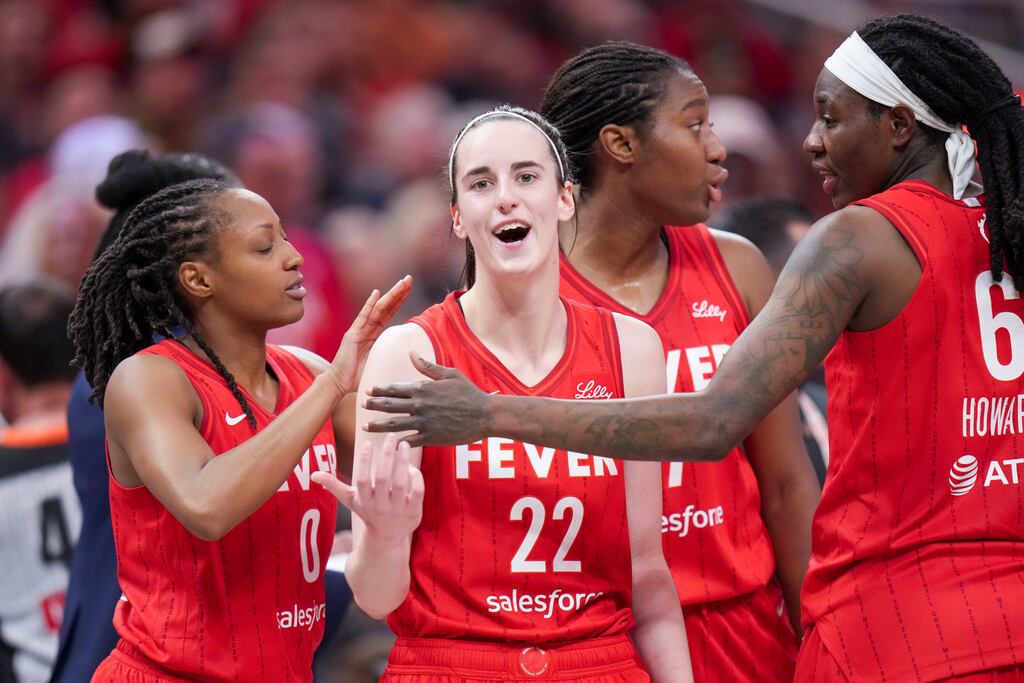
Insert laughing emoji here. As if we all just moved on. That never happens when these two are involved.
Think about it: There were two other flagrant fouls over that weekend, but they were barely acknowledged. Just part of the game. Meanwhile, the discussion about Clark and Reese ran the gamut from talk radio to television airways, from Pat McAfee to Stephen A. Smith, from Ryan Clark to Robert Griffin III.
Unfortunately, it wasn‘t so much about the foul itself, but how Clark and Reese feel about each other, reminders that women are often judged by their emotional outbursts, and rather than be free to show them, are expected to all just get along.
The competition of sports guarantees that won‘t always happen, and conflict in sports sells. So maybe the WNBA is happy to drink it all in, content with the increased fan engagement. The Fever-Sky Saturday game drew 2.7 million viewers on ABC, the most-viewed WNBA regular-season game since 2000. The game peaked at 3.1 million viewers, and represented a 115 percent increase over last year’s regular-season ABC average.
The second game of the doubleheader, featuring the defending champion New York Liberty against the Las Vegas Aces in a title series rematch, averaged 1.3 million viewers. The night before, with rookie Paige Bueckers making her debut in Dallas, the Ion broadcast of her game followed by the debut of the expansion Valkyries drew an average of 612,000 viewers, a 121 percent increase from a comparable window last season.
Rivalries fuel ratings. Take it back to the 2023 national championship game, when 12.3 million viewers watched Reese and LSU beat Clark and Iowa. But what fuels rivalries? Animus. Bird versus Magic. The Pistons “Bad Boys” era. Any Celtics-Lakers game or Celtics-Pistons game in the ’80s, when there was an immediate layer of intrigue over expected fisticuffs.
Longtime sports fans get it, but they’ve also developed a strong muscle for cynicism. They know the NBA wasn‘t all that eager to tamp down such drama, forced to address it only when fans started getting turned off.
Because there is always the risk of things turning too ugly. That same Fever-Sky game was marred by the contention on social media that a Fever fan directed abusive language toward Reese, prompting an investigation after the league insisted via statement that it “strongly condemns racism, hate, and discrimination in all forms.”
That quick response is important, given how ugly some of last year’s fan incidents became for players, how the league made a promise to combat online hate with renewed vigor moving forward, and how league-wide changes to chartered flights became the norm. But amid all the extra attention for issues from pay scales to security, the basketball needs to be talked about, too.
Because it’s awesome. Our own Veronica Burton helping Golden State to its first franchise win. A’ja Wilson still being awesome, Bueckers going home to Minnesota and becoming only the third player to record a double-double for points and assists inside her first three career games. The Liberty setting a regular-season WNBA record with 19 3-pointers Thursday night.
Those are the types of physical, exciting contests Clark was actually talking about when she said she knew more what to expect this time around, speaking to an offseason that allowed her to rest, work out, and reflect on her first year in the pros. It was quantifiably successful with both a Rookie of the Year award and a playoff appearance, but was also exhausting, coming so quickly as it did on the heels of another long collegiate campaign and so filled with the physicality, hard fouls, and talent in the WNBA.
And, of course, the drama. But as this league continues to grow, here’s to more talk about basketball, and less about conflict.
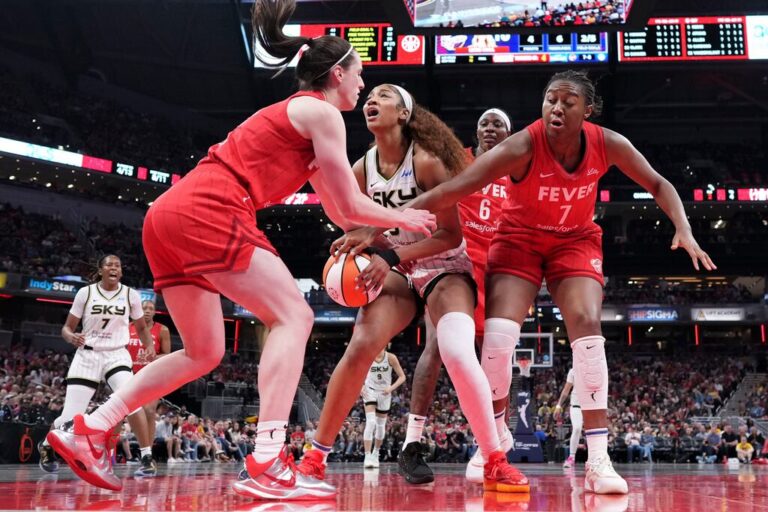
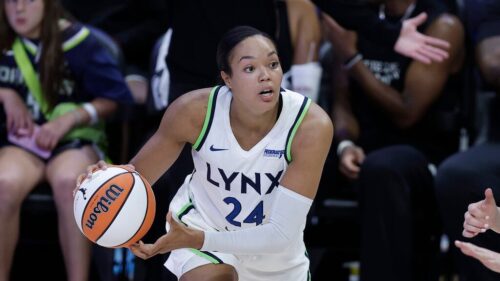
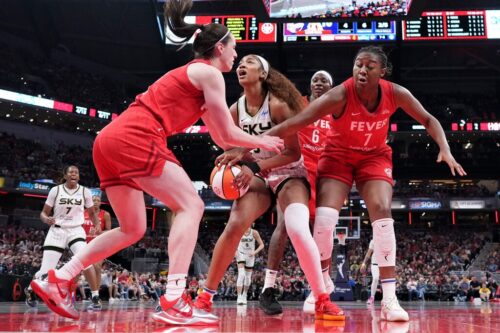
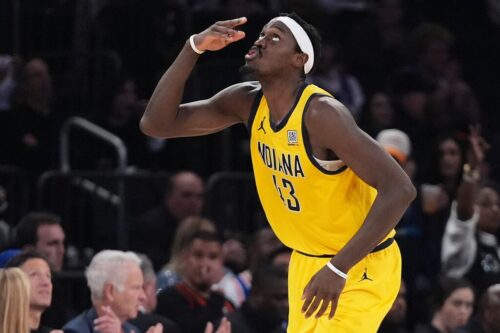
Comment count: